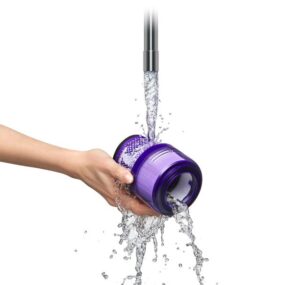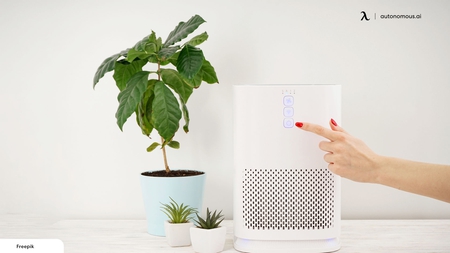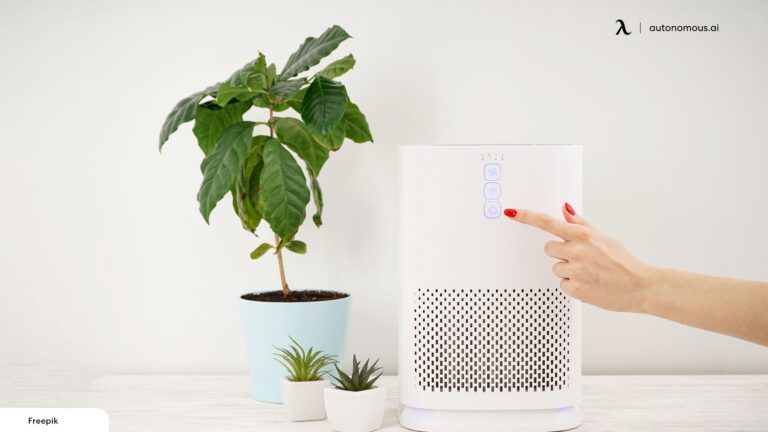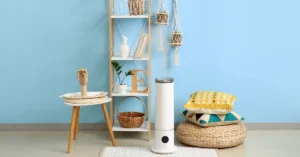An air purifier is designed to remove pollutants from the air, while a dehumidifier reduces moisture levels. Air quality is a growing concern today, increasing pollution levels and allergens.
Many people are interested in improving the air they breathe and reducing the risk of respiratory issues. Two common options to consider are air purifiers and dehumidifiers. We will discuss the differences between these two devices, their benefits, and how they can improve the indoor environment. Air Purifier and Dehumidifier Comparision
Whether you want to alleviate allergies, control humidity levels, or create a healthier home, understanding the advantages of air purifiers and dehumidifiers will help you make an informed decision that suits your needs. So, let’s dive in and explore the key differences and benefits of air purifiers and dehumidifiers.

Understanding The Differences
Air Purifiers And Dehumidifiers: An Introduction Air Purifier and Dehumidifier Comparision
Understanding the differences between air purifiers and dehumidifiers is essential in creating a healthy and comfortable indoor environment. While both devices contribute to improving air quality, they target different issues and operate in distinct ways. In this section, we will delve into the details of what air purifiers and dehumidifiers are and how they function.
What Is An Air Purifier?
An air purifier is a device designed to remove contaminants from the air, such as dust, pollen, pet dander, smoke, and mold spores. Its primary purpose is to eliminate harmful particles and improve air quality. By using various filtration methods, such as high-efficiency particulate air (HEPA) filters, activated carbon filters, and electrostatic precipitators, air purifiers capture and trap airborne pollutants, releasing clean and purified air back into the room.

What Is A Dehumidifier?
On the other hand, a dehumidifier is specifically designed to regulate the moisture levels in the air and reduce excess humidity. High humidity can lead to many problems, including mold growth, musty odors, and even respiratory issues. Dehumidifiers draw in humid air, cool it to condense the moisture, and then release dry air back into the room. This efficient process helps maintain a healthy level of humidity and prevents the growth of mold and mildew.
How Do They Work?
To better understand the differences, let’s take a closer look at how air purifiers and dehumidifiers work.
• Air Purifiers: These devices utilize various filtration mechanisms to capture and remove air pollutants. Renowned for their effectiveness, HEPA filters can trap particles as small as 0.3 micrometers, ensuring the air you breathe is virtually free from contaminants. Some air purifiers also employ activated carbon filters to absorb odors and harmful gases.
• Dehumidifiers: Dehumidifiers work through a process of condensation. The device pulls in air from the environment, cools it down using a refrigeration system, and extracts the moisture, which is then collected in a water tank or drained away. The dry air is reheated and expelled back into the room, lowering the overall humidity level.
While both air purifiers and dehumidifiers contribute to maintaining a healthier indoor atmosphere, they tackle different issues. Air purifiers focus on removing pollutants from the air, whereas dehumidifiers mainly target excessive moisture. Understanding their distinct functions empowers you to make an informed decision on which device suits your specific needs. Air Purifier and Dehumidifier Comparision

Credit: www.autonomous.ai
Controlling Humidity With Dehumidifiers
When it comes to maintaining a healthy indoor environment, controlling humidity levels plays a crucial role. Excess moisture in the air can lead to various problems, from mold growth and musty odors to damage to wooden furniture and even health issues like allergies and respiratory problems.
The Role Of Dehumidifiers In Reducing Excess Moisture
Dehumidifiers are an effective solution to tackle high humidity levels. By extracting moisture from the air, these devices help maintain optimal humidity levels, ensuring a comfortable and healthy living environment. Let’s explore why dehumidifiers are essential in combating excess humidity.
Understanding The Impact Of High Humidity Levels
High humidity levels can have a significant impact on both your health and your home. Excessive moisture in the air promotes the growth of mold, mildew, and dust mites, which can trigger allergies and respiratory issues. Additionally, high humidity can cause condensation on windows, leading to water damage, peeling paint, and even structural problems in the long run.
Indoor Conditions That Contribute To High Humidity
Several factors contribute to high humidity levels indoors, such as inadequate ventilation, water leaks, cooking, showering, and even the number of occupants in a room. If you notice condensation on windows, musty odors, or a clammy feeling in the air, the humidity levels likely need to be controlled.
Different Types Of Dehumidifiers And Their Functionality
Different types of dehumidifiers are available, each with its own functionality suited for various situations. Let’s take a closer look at the most common types:
| Type | Functionality |
|---|---|
| Refrigeration (compressor) dehumidifiers | These dehumidifiers use a refrigeration process to condense moisture from the air. They work by pulling humid air into the unit, cooling it to condense the moisture, and then reheating it before releasing it back into the room. Air Purifier and Dehumidifier Comparision |
| Desiccant dehumidifiers | Desiccant dehumidifiers utilize a desiccant material, such as silica gel or zeolite, to absorb moisture from the air. These dehumidifiers are effective even in low-temperature environments and are often used in colder climates or specific industrial applications. Air Purifier and Dehumidifier Comparision |
| Whole-house dehumidifiers | Designed to integrate with your HVAC system, whole-house dehumidifiers provide comprehensive moisture control for your entire home. These units work with your existing ductwork to remove excess humidity and maintain optimal levels throughout your house. Air Purifier and Dehumidifier Comparision |
Factors To Consider When Selecting A Dehumidifier
Choosing the right dehumidifier for your needs requires considering several important factors:
- Capacity and moisture removal rate: Consider the space size you need to dehumidify and choose a unit with an appropriate capacity and moisture removal rate.
- Drainage options: Determine whether you prefer manual or continuous drainage for your dehumidifier.
- Noise levels and energy efficiency: Look for dehumidifiers that operate quietly and have energy-saving features to minimize long-term costs.
Benefits And Limitations Of Using A Dehumidifier
Maintaining optimal humidity levels with the help of a dehumidifier offers various advantages:
- It prevents mold growth and protects your home from moisture-related damage.
- Reduces allergy and respiratory issues by minimizing the presence of dust mites, mold spores, and other allergens in the air.
- It enhances comfort by preventing that sticky and clammy feeling often associated with high humidity. Air Purifier and Dehumidifier Comparision
However, it’s important to be aware of a few considerations when using a dehumidifier:
- Dehumidifiers may increase energy consumption, so choosing an energy-efficient model and using it judiciously is essential. Air Purifier and Dehumidifier Comparision
- While dehumidifiers can improve indoor air quality, they do not address the root cause of high humidity, so it’s crucial to identify and address any underlying issues.
Final Thoughts: Making The Right Choice
Choosing between an air purifier and a dehumidifier can be a tough decision. Both appliances offer unique benefits and can greatly improve the quality of your indoor air. So, how do you make the right choice? It all comes down to weighing the pros and cons, considering your specific circumstances and budget, and prioritizing your indoor air quality and comfort needs.
Weighing The Pros And Cons
Before deciding, it’s important to evaluate the advantages and disadvantages of air purifiers and dehumidifiers. While air purifiers effectively remove allergens, dust particles, and pollutants from the air, dehumidifiers reduce excess moisture and prevent mold growth. Consider your specific needs and which appliance aligns better with your air quality goals. Air Purifier and Dehumidifier Comparision
Considering Your Specific Circumstances And Budget
Every home is unique, and your specific circumstances play a crucial role in determining whether an air purifier or a dehumidifier is the right choice for you. A dehumidifier may be the optimal solution if you live in a humid climate or struggle with mould issues. However, an air purifier can significantly improve indoor air quality if you suffer from allergies or respiratory problems. Consider your budget and choose the appliance that offers the most value for money. Air Purifier and Dehumidifier Comparision
Prioritizing Your Indoor Air Quality And Comfort Needs
Your indoor air quality and comfort should always be a top priority. Determine which aspects are most important to you. If you prioritize eliminating odors, pet dander, and harmful airborne particles, an air purifier might be ideal. On the other hand, if excessive humidity and the risk of mold growth are your main concerns, a dehumidifier should be at the top of your list. Consider your specific needs and choose the appliance that addresses them effectively.
Making An Informed Decision
Gather as much information as possible when deciding between an air purifier and a dehumidifier. Research different models, compare features, and read customer reviews to gain insights into real-life experiences. Don’t rush the process – take the time to make an informed decision based on objective facts and recommendations. Air Purifier and Dehumidifier Comparision
Seeking Expert Advice And Recommendations
If you’re still unsure which appliance is right, seeking expert advice can be immensely helpful. Talk to professionals or consult specialists in the field of indoor air quality. They can assess your specific needs, answer any questions you may have, and provide tailored recommendations based on their expertise and experience. Air Purifier and Dehumidifier Comparision
Evaluating Customer Reviews And Product Ratings
Customer reviews and product ratings can offer valuable insights when deciding between an air purifier and a dehumidifier. Read reviews from verified customers to understand the strengths and weaknesses of each appliance. Look for patterns, evaluate the overall ratings, and consider the feedback of other users. This information can guide you towards the appliance that best meets your expectations and requirements.
Remember, choosing the right one depends on your unique circumstances, preferences, and priorities. Consider the pros and cons and your needs, gather information, seek expert advice, and evaluate customer reviews. By doing so, you can confidently select an air purifier or a dehumidifier that will enhance indoor air quality and provide optimal comfort in your home.
Choosing The Right Option For Your Needs
When it comes to maintaining a healthy indoor environment, you might consider two important appliances: air purifiers and dehumidifiers. While both serve different purposes, they can work together to ensure comprehensive indoor air quality control. But how do you determine which device is right for your needs? Let’s dive in and explore the key factors to consider when making this decision. Air Purifier and Dehumidifier Comparision
H3understanding Your Specific Needs And Priorities/h3
When choosing between an air purifier and a dehumidifier, it’s crucial to start by understanding your specific needs and priorities. Are you mainly concerned about airborne pollutants like dust, pollen, or pet dander? Or do you live in a humid climate where excess moisture is a constant issue? Identifying your top priorities will help you make an informed decision and select the most suitable device.
H3assessing Your Indoor Air Quality Concerns/h3
An important aspect of choosing between an air purifier and a dehumidifier is assessing indoor air quality concerns. If you frequently experience allergies or respiratory issues, an air purifier can help remove harmful particles from the air, providing relief and improving your overall well-being. On the other hand, if you notice excessive humidity, condensation on windows, or a musty odor, a dehumidifier can effectively reduce moisture levels and prevent mold growth.
H3identifying Humidity-related Issues/h3
Humidity-related issues can have a significant impact on your comfort and health. Excess humidity can lead to mold and mildew growth, triggering allergies and respiratory problems. If you notice these issues in your home, investing in a dehumidifier can help maintain optimal humidity levels and create a healthier environment. However, if your main concern is eliminating airborne contaminants, particularly if you have pets or live in a polluted area, an air purifier may be the better choice. Air Purifier and Dehumidifier Comparision
Combining air Purifiers And Dehumidifiers For Comprehensive Indoor Air Control/h3
In some cases, combining air purifiers and dehumidifiers can provide comprehensive indoor air control. You can create a healthier and more comfortable living space by removing airborne pollutants and excess moisture. This combination can be particularly beneficial if you live in a humid area with high levels of pollutants or have specific health concerns related to humidity and airborne particles. Air Purifier and Dehumidifier Comparision
H3when To Consider Using Both Devices/h3
There are specific situations where an air purifier and a dehumidifier are recommended. If you live in a humid area with significant air pollution, combining these devices can help tackle both moisture and particle-related issues. Additionally, individuals with respiratory conditions or allergies can greatly benefit from using both devices to ensure clean and dry air in their living spaces.
H3placement And Usage Tips For Maximum Effectiveness/h3
Proper placement and usage are crucial for maximum effectiveness when using either an air purifier or a dehumidifier. Here are some tips to consider:
- Place the air purifier in a central location to ensure maximum coverage for all areas of your home.
- If you have multiple floors, consider using multiple air purifiers to optimize air quality throughout your living space.
- Position the dehumidifier in areas with high humidity, such as basements or bathrooms.
- Follow the manufacturer’s instructions regarding the appropriate humidity level on your dehumidifier.
- Regularly clean and maintain both devices according to the manufacturer’s recommendations to ensure optimal performance.
By following these placement and usage tips, you can maximize the effectiveness of your air purifier and dehumidifier, ensuring a healthier and more comfortable indoor environment.
Factors To Consider For Optimal Performance
Several factors are pivotal in determining their overall performance when comparing air purifiers and dehumidifiers. Considering these factors ensures that you get the most out of your chosen appliance and create a healthy and comfortable living environment. The key considerations include maintenance and care, regular servicing, energy efficiency, power consumption, and long-term savings. Let’s delve into each aspect in detail. Air Purifier and Dehumidifier Comparision
Maintenance And Care For Air Purifiers And Dehumidifiers
Proper maintenance and care are essential to keep your air purifier or dehumidifier running smoothly and effectively. Maintaining cleanliness helps optimize their performance and prolong their lifespan. To ensure optimal functioning:
- Regularly clean the exterior surfaces using a damp cloth to remove dust and dirt.
- To allow proper airflow, keep the air intake and exhaust vents clear of obstructions.
- Wipe the water collection reservoir (for dehumidifiers) frequently to prevent mold and bacteria growth. Air Purifier and Dehumidifier Comparision
Cleaning Filters And Replacing Parts
The filters in air purifiers and dehumidifiers play a crucial role in removing contaminants and maintaining air quality. Regularly cleaning or replacing the filters is essential for optimal performance. Here are some tips:
- Carefully follow the manufacturer’s instructions for filter maintenance and replacement.
- Vacuum or wash the pre-filters and reusable filters according to the provided guidelines.
- Replace HEPA filters (in air purifiers) or desiccant materials (in dehumidifiers) at recommended intervals. Air Purifier and Dehumidifier Comparision
Regular Servicing And Troubleshooting Tips
Periodic servicing of your air purifier or dehumidifier ensures its continued effectiveness. Additionally, being aware of common troubleshooting tips can help you identify and resolve any issues. Consider the following:
- Arrange professional servicing and cleaning at least once a year to address hidden problems.
- If your device malfunctions, consult the user manual for troubleshooting steps before seeking professional help. Air Purifier and Dehumidifier Comparision
- Keep a record of warranty details and contact information for technical support.
Energy Efficiency And Cost Considerations
Efficient energy usage is not only environmentally friendly but also cost-effective. Before purchasing an air purifier or dehumidifier, assess its energy efficiency and long-term cost implications. Keep these points in mind:
- Look for products with ENERGY STAR certification or energy-saving features.
- Consider the device’s power consumption and its impact on your monthly utility bills.
- Weigh the upfront cost against potential long-term savings and benefits.
Power Consumption And Operating Costs
Understanding your chosen appliance’s power consumption and operating costs allows you to budget your expenses and make an informed decision. Consider the following aspects:
- Check the device’s power rating and estimated annual energy consumption indicated on the product label. Air Purifier and Dehumidifier Comparision
- Calculate the monthly operating costs by multiplying the energy consumption with local utility rates.
- Factor in additional costs, such as filter replacements, maintenance, and repairs.
Long-term Savings And Value For Money
When investing in an air purifier or dehumidifier, considering long-term savings and value for money is crucial. Evaluating the device’s effectiveness, lifespan, and associated costs ensures you make the most economical choice:
- Research customer reviews and performance ratings to gauge the device’s efficiency.
- Consider the manufacturer’s warranty period and determine the anticipated lifespan of the appliance. Air Purifier and Dehumidifier Comparision
- Weigh the upfront cost against the expected benefits and long-term cost savings.
Improving Indoor Air Quality With Air Purifiers
Ensuring a clean and healthy indoor environment is essential for your overall well-being. The air we breathe in our homes can be filled with various pollutants, such as dust, allergens, pet dander, and even harmful chemicals. That’s where air purifiers come to the rescue. These devices are designed to eliminate airborne pollutants and improve the quality of the air we breathe. In this article, we will explore the role of air purifiers in removing airborne pollutants and the importance of clean air in the home. Air Purifier and Dehumidifier Comparision
The Role Of Air Purifiers In Removing Airborne Pollutants
Air purifiers are crucial in removing airborne pollutants from the indoor environment. These pollutants can originate from various sources, such as outdoor air pollution, household cleaning products, and everyday activities like cooking. The primary function of an air purifier is to capture these particles and eliminate them from the air, ensuring cleaner and fresher indoor air quality. Air Purifier and Dehumidifier Comparision
Importance Of Clean Air In The Home
Clean air is vital for maintaining good health and well-being, especially in indoor spaces where we spend significant time. Poor indoor air quality can lead to various health issues, including respiratory problems, allergies, and even aggravation of conditions like asthma. Using an air purifier, you can significantly reduce pollutants in your home and create an environment that promotes better health and overall well-being for you and your family.
Common Indoor Pollutants And Their Health Effects
Indoor air pollutants come in many forms, and their effects on health can vary. Some common indoor pollutants include:
- Pollen: Known to trigger allergies and respiratory symptoms. Air Purifier and Dehumidifier Comparision
- Dust mites Can cause allergies and asthma symptoms.
- Pet dander: Can trigger allergic reactions in sensitive individuals.
- Mold spores Can cause respiratory issues and allergic reactions.
- Volatile organic compounds (VOCs): Found in household cleaning products, paints, and furniture, these chemicals can cause eye, nose, and throat irritation, as well as headaches and dizziness. Air Purifier and Dehumidifier Comparision
- Tobacco smoke: A major source of indoor air pollution, it can lead to respiratory problems and increase the risk of lung cancer.
How Air Purifiers Capture And Eliminate Pollutants
Air purifiers use various technologies to capture and eliminate pollutants from the air. The most common and effective method is using filters, such as HEPA and activated carbon filters.
HEPA (High-Efficiency Particulate Air) filters are designed to trap particles as small as 0.3 microns with a 99.97% efficiency. They can effectively capture allergens, dust, mold spores, viruses, and bacteria. Air Purifier and Dehumidifier Comparision
Activated carbon filters, on the other hand, are excellent at capturing and eliminating odors, gases, and volatile organic compounds (VOCs). These filters work by adsorbing the pollutants onto a porous carbon surface, trapping them and preventing them from recirculating into the air.
Key Features To Consider When Choosing An Air Purifier
When selecting an air purifier, there are several key features to consider:
- Filtration systems: Look for air purifiers with HEPA and activated carbon filters for optimal pollutant removal. Air Purifier and Dehumidifier Comparision
- Coverage area and room size considerations: Ensure that the air purifier is suitable for the size of the room or area you want to purify.
- Noise levels and energy efficiency: Consider the air purifier’s noise levels and energy consumption, especially if you plan to use it in bedrooms or other quiet spaces.
Pros And Cons Of Using An Air Purifier
Using an air purifier has its share of advantages and disadvantages:
| Pros | Cons |
|---|---|
|
|
Benefits Of Using An Air Purifier
The benefits of using an air purifier in your home go beyond just cleaner air. Some of the key benefits include:
- Improved respiratory health: Air purifiers can help alleviate respiratory issues such as allergies and asthma by reducing indoor air pollutants.
- Better sleep quality: Cleaner air can promote better sleep by reducing irritants that may disrupt sleep patterns. Air Purifier and Dehumidifier Comparision
- Odor elimination: Air purifiers with activated carbon filters can help eliminate unpleasant odors from cooking, pets, or other sources.
- Reduced exposure to harmful chemicals: Air purifiers can help remove volatile organic compounds (VOCs) and other chemicals that may be present in indoor spaces.
- Peace of mind: Knowing that you and your family breathe cleaner air can provide peace of mind and contribute to a healthier and more comfortable living environment.
Limitations And Potential Drawbacks
While air purifiers offer numerous benefits, there are a few limitations and potential drawbacks to keep in mind:
- Cost of purchase and maintenance: Air purifiers can be an investment, both in terms of the initial cost and ongoing filter replacements.
- Effectiveness varies depending on pollutants: The effectiveness of an air purifier may vary depending on the types and levels of pollutants present in the indoor environment.
- Noise levels: Some air purifiers can produce noticeable noise, especially on higher fan speeds, which may be bothersome in quiet spaces.
- Regular filter replacements: Filters in air purifiers must be replaced regularly to maintain their effectiveness, which can add to the cost and maintenance requirements.
Frequently Asked Questions On Air Purifier Vs Dehumidifier
Do I Need Both A Dehumidifier And an Air Purifier?
No, you don’t need both a dehumidifier and an air purifier. A dehumidifier removes excess moisture from the air, while an air purifier eliminates toxins and allergens. Having one or the other depends on your specific needs and environment.
Do Air Purifiers Work As Dehumidifier?
No, air purifiers do not work as dehumidifiers. Air purifiers are designed to remove airborne particles, pollutants, and odors from the air, while dehumidifiers reduce moisture levels in a room. Although some air purifiers may have a small drying effect, they are not intended to function as dehumidifiers.
Do I Need An Air Purifier Or Dehumidifier For Mold?
Yes, you may need an air purifier or dehumidifier for mold. Both devices can help control moisture levels and improve indoor air quality, reducing the risk of mold growth. Installing an air purifier or dehumidifier can be beneficial in preventing and removing mold from your environment.
Is It OK to Use An Air Purifier And A Dehumidifier In The Same Room?
Yes, using an air purifier and a dehumidifier in the same room is okay. Both appliances serve different purposes – an air purifier helps remove airborne pollutants, while a dehumidifier reduces excess moisture. Combining them can improve indoor air quality and create a healthier living environment.
Conclusion
To sum up, both air purifiers and dehumidifiers serve a unique purpose in improving indoor air quality. While air purifiers effectively remove airborne pollutants, dehumidifiers combat excessive moisture. The choice between the two ultimately depends on the specific needs of your space.
Consider factors like humidity levels, allergies, and respiratory conditions to make an informed decision. Considering these considerations, you can ensure a clean and comfortable living environment for yourself and your loved ones.




